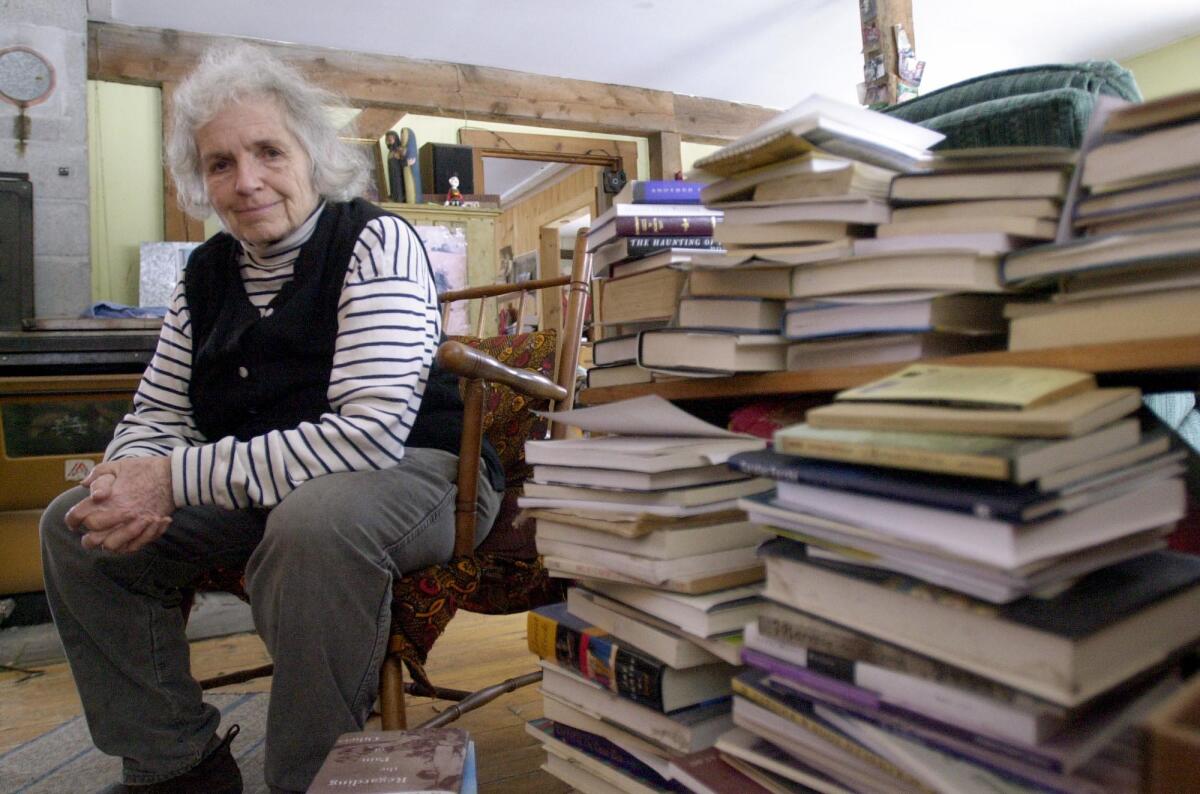Opinion: 30 years ago, Grace Paley foresaw today’s clash over antisemitism

In recent months, as clashes over the war in Gaza have fractured American campuses — including my own at UCLA — I’ve been thinking frequently of Grace Paley’s 1991 story “Three Days and a Question.” In this short, autobiographical tale, the Jewish American author and activist recounts three scenes that take place over the course of three days on the streets of New York. In each case, a bare arm is proffered by someone who has suffered trauma. As its title suggests, Paley’s story offers not easy answers but probing questions: questions about Jewish identity, antisemitism and the difficulties of solidarity that remain as urgent as they were when Paley was writing. (She died in 2007.)
All three of the scenes Paley recounts resonate 30 years later, but the first one is uncannily familiar in our moment of conflict. The story opens:
“On the first day I joined a demonstration opposing the arrest in Israel of members of Yesh Gvul, Israeli soldiers who had refused to serve in the occupied territories. Yesh Gvul means: There is a Limit.” As with today’s campus protests, this demonstration, which takes place during the first Intifada, is teeming with members of the press, including an anchorwoman.
“‘What do you think?’ the anchorwoman asked. ‘What do you think,’ she asked a woman passer-by — a woman about my age.
“‘Anti-Semites,’ the woman said quietly.
“The anchorwoman said, ‘But they’re Jewish.’
“‘Anti-Semites,’ the woman said, a little louder.”
At this point, one of the demonstrators steps forward and confronts the passerby in accented English: “Are you crazy? How can you … Listen what we’re saying…. How you dare to say that — all of us Jews. Me, he said. He pulled up his shirtsleeve. Me? You call me? You look. He held out his arm. Look at this.” The passerby refuses. But the demonstrator persists: “You look at my number, what they did to me. My arm … you have no right.” She remains unmoved: “‘Anti-Semite,’ she said between her teeth. ‘Israel hater.’” The demonstrator, now revealed to be a survivor bearing a Nazi-inflicted tattoo, responds despairingly: “No, no he said, you fool. My arm — you’re afraid to look … my arm … my arm.”

Many who are Jewish will recognize the scene Paley describes. Whether on social media, in family discussions or on campuses, versions of intra-Jewish conflict are a constant feature of our post-Oct. 7 moment — as, in truth, they have been for some time. The horrific events of Oct. 7 and Israel’s catastrophic war against Gaza have exacerbated tensions among American Jews about how to think about Zionism, Jewish identity and Jewish ethics. While the mainstream Jewish community remains staunchly supportive of Israel, polls also show a growing generational divide, with many younger Jews embracing the Palestinian cause. Across the United States, there are Jewish students and faculty on both sides of the barriers set up on campuses around Palestinian solidarity encampments. Jewish division has probably never been so visible in this country.
Paley’s story also presciently predicts a phenomenon that is becoming increasingly prominent: the weaponization of charges of antisemitism to stifle dissent about Israeli actions. As Paley emphasizes, even a critic with the most radical personal experience of antisemitism — deportation to Auschwitz — can be accused of anti-Jewishness. Paley seems to have grasped decades in advance just how politically charged and consequential the issue of antisemitism would become.
Today, we are faced with a situation in which the accusation leveled by Paley’s passerby may take on the force of law. On May 1, the House of Representatives passed the Antisemitism Awareness Act, which if passed by the Senate and signed by President Biden would link federal antidiscrimination laws to the International Holocaust Remembrance Alliance’s controversial “working definition of antisemitism.” Beyond the vagueness of the definition itself, the alliance’s definition is subject to abuse because of the illustrative examples that accompany it, which disproportionately identify forms of antisemitism with criticism of Israel and Zionism. If signed into law, it would make critics of Israel even more vulnerable than they are now. As Paley predicts and as we see playing out in Germany, it would lead, absurdly, to the targeting of many Jews as antisemites.
Paley’s story, however, does not stop with this unsettling encounter between demonstrator and accuser. Her final two vignettes clarify that she is more broadly interested in how confrontations with suffering and injustice provoke discomfort. On the second day the narrator meets a young man with AIDS who bares his arm to show her his lesions while begging for money: “No one will help me. … Look at my arm. … Have you ever seen lesions? That’s what people see.” On the third day, a Haitian taxi driver stops his cab, holds his bare arm up to the passenger divider and asks why refugees from his country are refused entry: “You tell me — this skin, this black skin — why? Why you hate this skin so much?”
The tale concludes with Paley’s own question. What does it mean, she asks, to have confronted “those gestures, those arms, the three consecutive days” of unsettling encounters? Her question is our question too — a question about how we should respond to an excess of suffering, to conflicts with kin and colleagues, to clashing narratives about war and peace. Instead of offering easy answers, Paley’s story helps us see discomfort as a necessary component of solidarity.
Today’s protests about the war in Gaza have generated anger and accusations of antisemitism, just like the protest depicted by Paley; it is, indeed, disturbing to be confronted with the realities of political violence. Gaza is not the only place of suffering on Earth; there is more than enough all over. But if we look away or try to deflect, like the passerby in the first vignette who mutters “antisemite,” we risk becoming complicit in the injustice unfolding around us — both outside our doors and thousands of miles away.
Michael Rothberg teaches English, comparative literature and Holocaust studies at UCLA.

